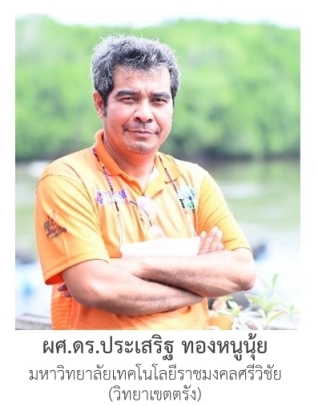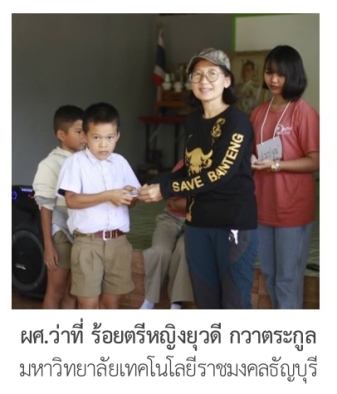Community And Environment
U-Volunteer Project
U-Volunteer Project
มูลนิธิสุทธิรัตน์ อยู่วิทยา ร่วมมือกับ 4 สถาบันการศึกษาทำการบันทึกข้อตกลงความร่วมมือ (Memorandum of Understanding : MOU) ในการดำเนินงานให้บริการด้านวิชาการ และส่งเสริม/สนับสนุนกิจกรรมที่ส่งผลต่อการขับเคลื่อนงานด้านอนุรักษ์ทรัพยากรธรรมชาติและสัตว์ป่า และด้านยกระดับเกษตรกรสู่การเป็นผู้ประกอบการธุรกิจชุมชน เป็นระยะเวลา 3 ปี โดยดำเนินการใน 4 พื้นที่ ดังนี้
1) มหาวิทยาลัยเทคโนโลยีราชมงคลธัญบุรี สนับสนุนการขับเคลื่อนงานอนุรักษ์และขยายพันธุ์วัวแดง ร่วมกับศูนย์ศึกษาธรรมชาติและสัตว์ป่าเขาน้ำพุ จังหวัดกาญจนบุรี
2) มหาวิทยาลัยศิลปากร (วิทยาเขตสารสนเทศเพชรบุรี) สนับสนุนการขับเคลื่อนงานอนุรักษ์ประมงพื้นบ้าน ร่วมกับกลุ่มเกษตรกรทำประมงปากน้ำปราณ จังหวัดประจวบคีรีขันธ์
3) มหาวิทยาลัยเทคโนโลยีราชมงคลศรีวิชัย (วิทยาเขตตรัง) สนับสนุนการขับเคลื่อนงานอนุรักษ์และฟื้นฟูหญ้าทะเล ร่วมกับกลุ่มวิสาหกิจชุมชนเลี้ยงปลากระชังบ้านพรุจูด จังหวัดตรัง
4) มหาวิทยาลัยเชียงใหม่ สนับสนุนการขับเคลื่อนงานส่งเสริมกลุ่มเกษตรกรสู่ผู้ประกอบการธุรกิจชุมชน ร่วมกับวิสาหกิจชุมชนกลุ่มข้าวทิพย์ช้างอำเภอห้างฉัตร จังหวัดลำปาง
U-Volunteer Project
โครงการ U-Volunteer ขับเคลื่อนงานอนุรักษ์และขยายพันธุ์วัวแดง ปี 2564 (ปีที่ 1)
มูลนิธิสุทธิรัตน์ อยู่วิทยา ร่วมมือกับ มหาวิทยาลัยราชมงคลธัญบุรี และศูนย์ศึกษาธรรมชาติและสัตว์ป่าเขาน้ำพุ จังหวัดกาญจนบุรี ในการขับเคลื่อนงานอนุรักษ์และขยายพันธุ์วัวแดง โดยมีเป้าหมายเพื่อเชื่อมพื้นที่วัวแดงจากเขตพื้นที่ป่าสลักพระสู่เขตพื้นที่ป่าห้วยขาแข้ง ภายในปี 2566
การดำเนินโครงการ
ผู้ช่วยศาสตราจารย์ว่าที่ร้อยตรีหญิงยุวดี กวาตระกูล นำคณะนักศึกษามหาวิทยาลัยเทคโนโลยีราชมงคลธัญบุรี ลงพื้นที่เก็บข้อมูลชุมชน และจัดทำแผ่นพับชุดความรู้ และป้ายไวนิลเกี่ยวกับวัวแดง เพื่อเผยแพร่ความรู้เรื่องการอนุรักษ์วัวแดงให้กับชุมชนบ้านตีนตก ตำบลเขาโจด อำเภอศรีสวัสดิ์ จังหวัดกาญจนบุรี ดังนี้
1) กิจกรรมรู้จักวัวแดง “การมีส่วนร่วมของชุมชนในการอนุรักษ์วัวแดง” ลงพื้นที่เก็บข้อมูลชุมชนและสร้างความรู้ความเข้าใจเกี่ยวกับการอนุรักษ์วัวแดงในพื้นที่ชุมชน และโรงเรียน โดยมุ่งเน้นไปที่เยาวชน และประชาชนในพื้นที่ เพื่อนำข้อมูลมาใช้ในการออกแบบแผนการอนุรักษ์วัวแดงที่ไม่สร้างหรือลดผลกระทบต่อชุมชน
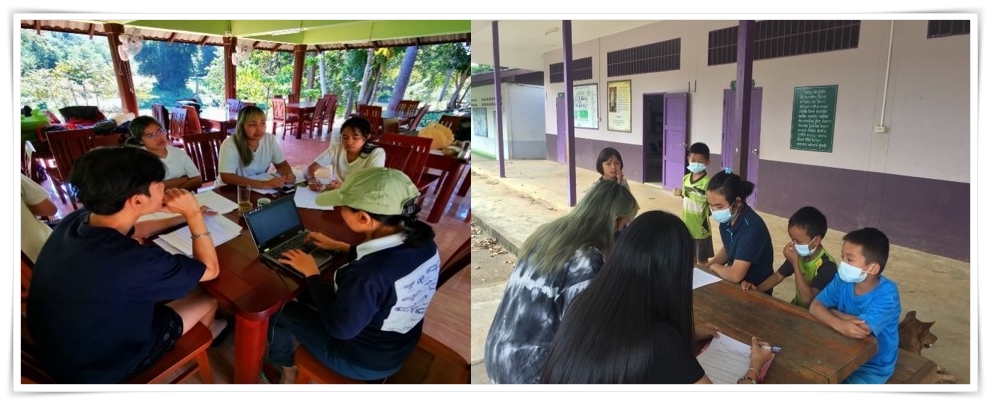
2) จัดทำป้ายและแผ่นพับให้ความรู้เกี่ยวกับวัวแดง อาทิ ประวัติความเป็นมา ความสำคัญต่อระบบนิเวศในพื้นที่ แหล่งที่อยู่อาศัย ลักษณะและพฤติกรรม รวมถึงโครงการปล่อยวัวแดงคืนสู่ธรรมชาติ เพื่อสร้างการรับรู้ ความเข้าใจ และความตระหนักในความสำคัญของวัวแดงต่อธรรมชาติ ให้กับคนในชุมชน
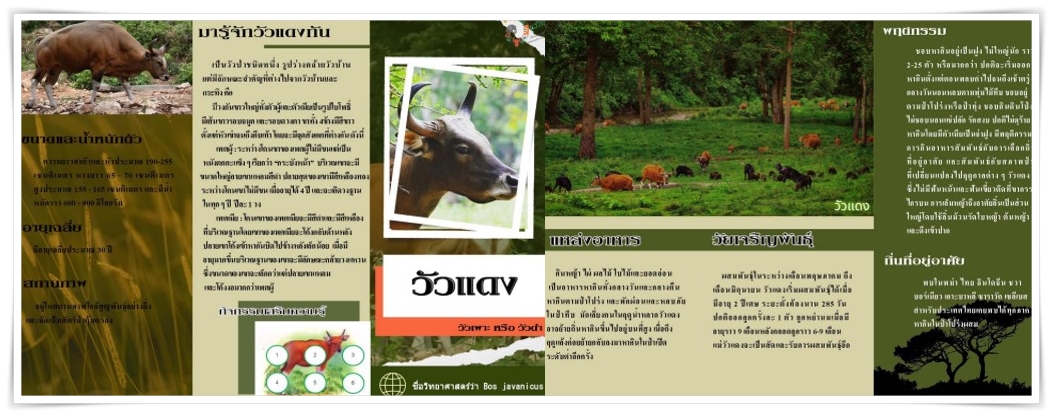
โครงการ U-Volunteer ขับเคลื่อนงานอนุรักษ์ประมงพื้นบ้าน ปี 2564
มูลนิธิสุทธิรัตน์ อยู่วิทยา ร่วมมือกับ มหาวิทยาลัยศิลปากร (วิทยาเขตสารสนเทศเพชรบุรี) และกลุ่มเกษตรกรทำประมงปากน้ำปราณ จังหวัดประจวบคีรีขันธ์ ขับเคลื่อนงานการอนุรักษ์ประมงพื้นบ้าน โดยมีเป้าหมายยกระดับเกษตรกรผู้ทำประมงสู่การเป็นผู้ประกอบการธุรกิจชุมชน ภายในปี 2566 (เริ่มปี 2564)
การดำเนินโครงการ
อาจารย์รชกร วชิรสิโรดม นำคณะนักศึกษามหาวิทยาลัยศิลปากร (วิทยาเขตสารสนเทศเพชรบุรี) ลงพื้นที่จัดอบรมให้ความรู้เกี่ยวกับการการจัดตั้งกลุ่มวิสาหกิจ และการบริหารจัดการกลุ่มแปรรูปผลิตภัณฑ์ การวางแผนการแปรรูปผลิตภัณฑ์ที่สอดคล้องตามมาตรฐาน อย. ช่องทางการตลาดการจำหน่ายผลิตภัณฑ์ และการปรับปรุงสถานที่เพื่อให้การแปรรูปผลิตภัณฑ์ถูกสุขลักษณะ และเป็นไปตามมาตรฐานด้านความปลอดภัย
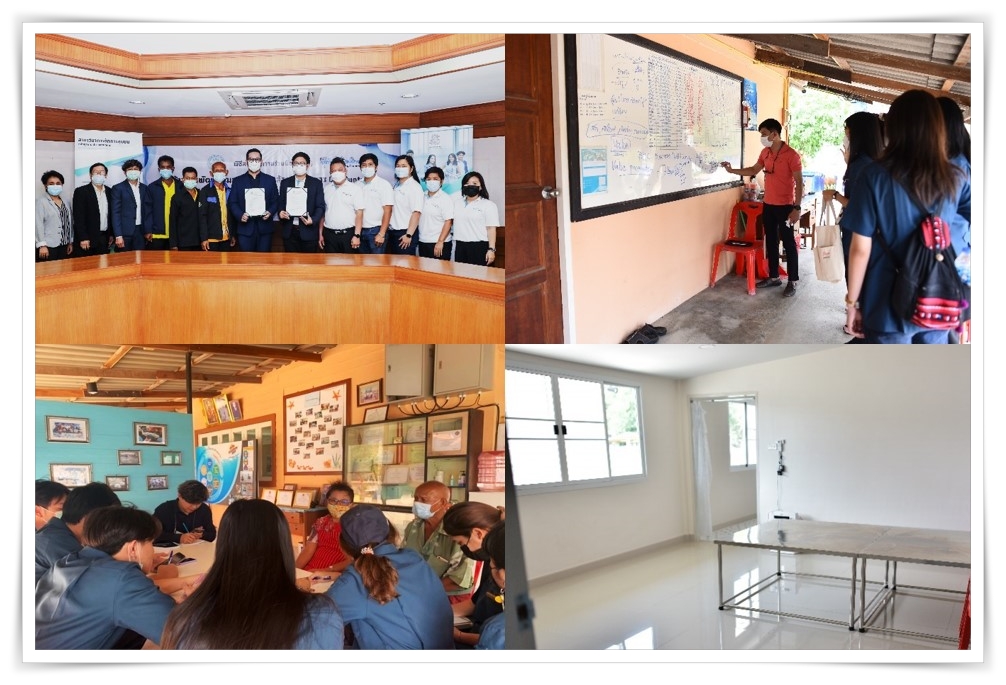
ผลการดำเนินโครงการในปีที่ 1 เกิดการจัดตั้งกลุ่มและจดเป็นวิสาหกิจชุมชนในชื่อ “วิสาหกิจชุมชนแปรรูปสินค้าประมงพื้นบ้านปากน้ำปราณ” และปรับปรุงห้องการแปรรูป และบรรจุภัณฑ์ของกลุ่มให้ถูกสุขลักษณะ มีคุณภาพสอดคล้องตามมาตรฐาน อย. ภายในปี 2566
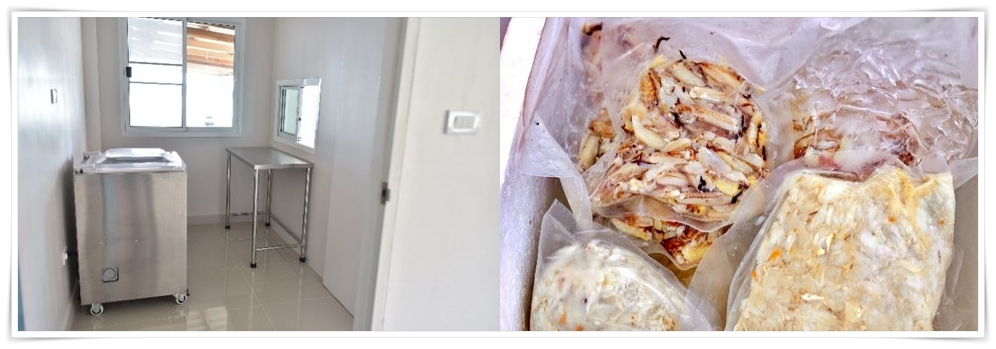
โครงการ U-Volunteer ขับเคลื่อนงานอนุรักษ์และขยายพันธุ์หญ้าทะเล ปี 2564
มูลนิธิสุทธิรัตน์ อยู่วิทยา ร่วมมือกับ มหาวิทยาลัยเทคโนโลยีราชมงคลศรีวิชัย (วิทยาเขตตรัง) และวิสาหกิจชุมชนเลี้ยงปลากระชังบ้านพรุจูด จังหวัดตรัง ขับเคลื่อนงานการอนุรักษ์และขยายพันธุ์หญ้าทะเล โดยมีเป้าหมายเพื่อเพิ่มพื้นที่หญ้าทะเล จำนวน 50 ไร่ ภายในปี 2566 (เริ่มปี 2564)
การดำเนินโครงการ
ผู้ช่วยศาสตราจารย์ ดร.ประเสริฐ ทองหนูนุ้ย นำนักศึกษามหาวิทยาลัยเทคโนโลยีราชมงคลศรีวิชัย (วิทยาเขตตรัง) ลงสำรวจพื้นที่สำหรับงานวิจัยการปลูกหญ้าทะเลบริเวณเกาะผี บ้านพรุจูด ตำบลบ่อหิน อำเภอสิเกา จังหวัดตรัง โดยได้กำหนดขอบเขตแปลงปลูกหญ้าทะเลบริเวณน้ำขึ้นน้ำลง ต่ำสุด ที่มีหญ้าทะเลอยู่เดิม และทำแผนที่แปลงปลูกหญ้าทะเล ซึ่งกำหนดพื้นที่ขนาดแปลงๆ ละ 40x40 เมตร ในพื้นที่ขนาด 3 ไร่ เพื่อวิจัย ในเรื่องพันธุ์หญ้าทะเลที่เหมาะสมกับพื้นที่ และการเปลี่ยนแปลงของระบบนิเวศ ซึ่งจะเก็บข้อมูลการวิจัยเพื่อใช้การวางแผนการปลูกหญ้าทะเลที่มีประสิทธิภาพในระยะต่อไป
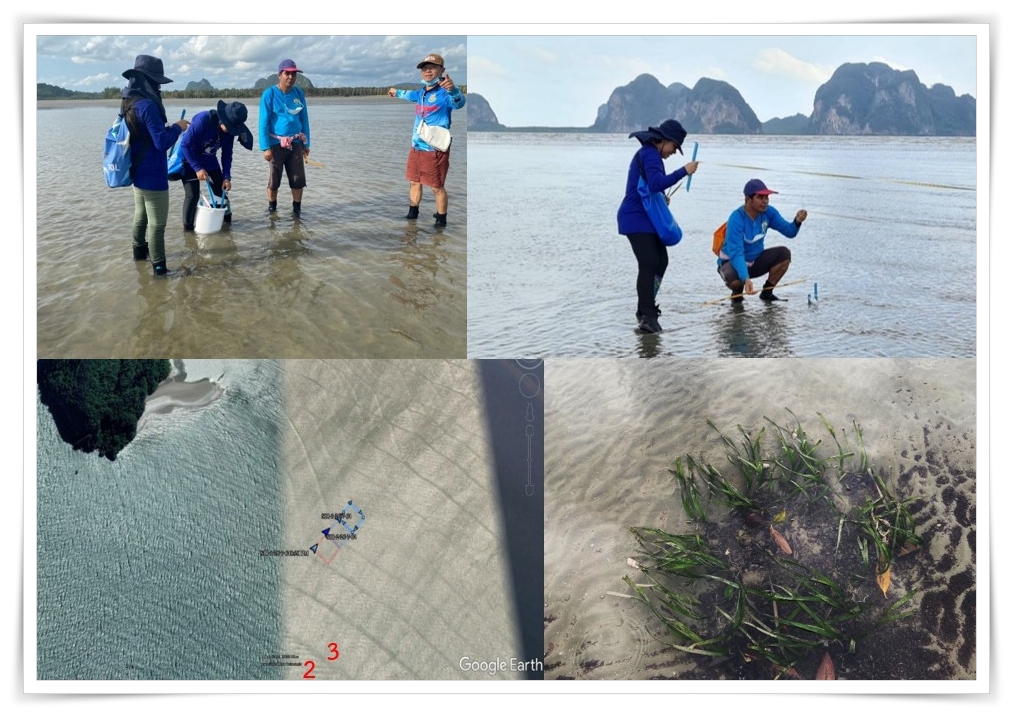
โครงการ U-Volunteer ขับเคลื่อนงานพัฒนาและส่งเสริมเกษตรกรสู่การเป็นผู้ประกอบการธุรกิจชุมชน ปี 2564
มูลนิธิสุทธิรัตน์ อยู่วิทยา ร่วมมือกับ มหาวิทยาลัยเชียงใหม่ และวิสาหกิจชุมชนกลุ่มข้าวทิพย์ช้างอำเภอห้างฉัตร จังหวัดลำปาง ขับเคลื่อนงานด้านการพัฒนาและยกระดับศักยภาพของกลุ่มในการผลิตสารสกัดจากผงผิวข้าวให้มีคุณภาพสูง โดยมีเป้าหมายเพื่อยกระดับเกษตรกรผู้ปลูกข้าวสู่การเป็นผู้ประกอบการธุรกิจชุมชน ภายในปี 2566 (เริ่มปี 2564)
การดำเนินโครงการ
ผู้ช่วยศาสตราจารย์ ดร. ภูมน สุขวงศ์ อาจารย์มหาวิทยาลัยเชียงใหม่ นำนักศึกษามหาวิทยาลัยเชียงใหม่ลงพื้นที่เก็บข้อมูล และพัฒนาระบบการแปรรูปรำข้าวเป็นสารสกัดผงผิวข้าวจ้าวอินทรีย์สีเข้ม เพื่อให้ได้ผลผลิตผลิตที่มีคุณภาพในด้านสารอาหาร ถูกสุขลักษณะ ไม่มีการปนเปื้อน และมีการแปรรูปที่สอดคล้องตามมาตรฐาน อย. โดยได้ดำเนินงานโครงการตามแผนงาน ดังนี้
1) ดำเนินการวิเคราะห์สภาวะปัจจุบันของกลุ่มวิสาหกิจฯ ในแนวทางปฏิบัติการผลิตสารสกัดผงผิวข้าว
2) ดำเนินการสร้างมาตรฐานรายละเอียดขั้นตอนในการผลิตผงผิวข้าว
3) ดำเนินการอบรมสร้างสร้างความเข้าใจเรื่องมาตรฐานการผลิตอาหาร
4) สนับสนุนเครื่องมือและอุปกรณ์ในการผลิตผงผิวข้าวให้ได้มาตรฐาน
5) ดำเนินการประเมินและทดสอบคุณภาพ
จากการประเมินผลการดำเนินงานของวิสาหกิจชุมชนกลุ่มข้าวทิพยาช้างฯ ทำให้เห็นถึงศักยภาพในการผลิตสารสกัดผงผิวข้าวให้มีมาตรฐาน จึงได้มีการอบรมให้ความรู้และสนับสนุนเครื่องมือในการดำเนินงานของกลุ่มเพื่อให้ขั้นตอนและกระบวนการผลิตได้มาตรฐานและมีคุณภาพ และเป็นการยกระดับศักยภาพของกลุ่มในด้านการผลิต ให้เป็นผู้ประกอบการธุรกิจชุมชนที่มีคุณภาพ และเป็นต้นแบบต่อไป
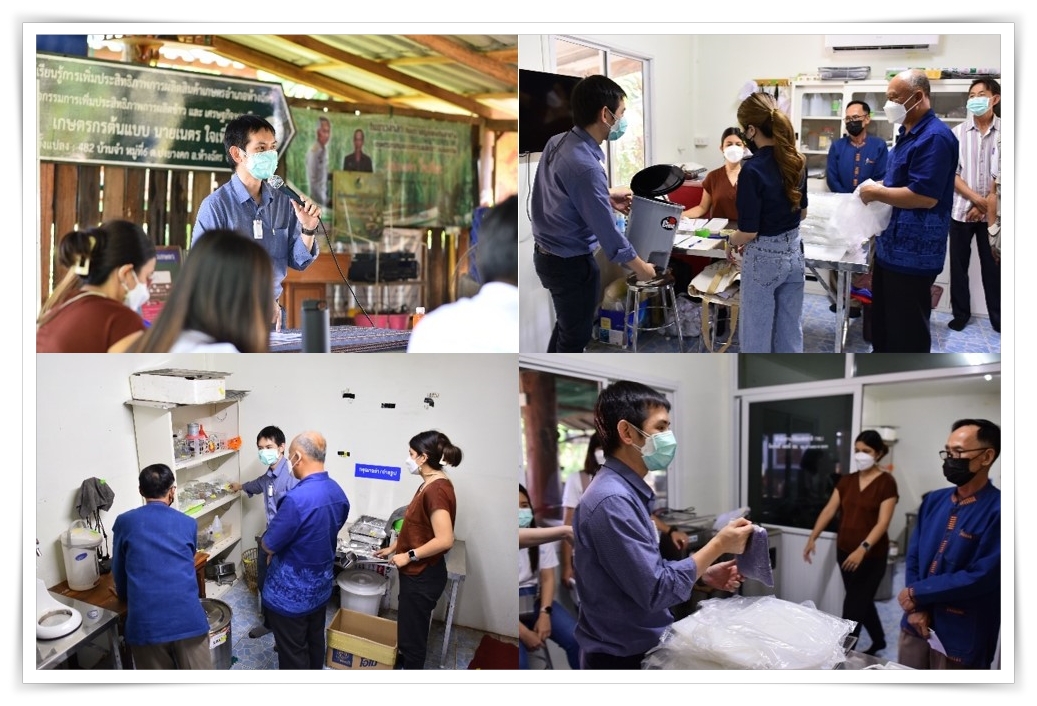
ผลสะท้อนจากอาจารย์ที่ปรึกษา
“โครงการ U-Volunteer”
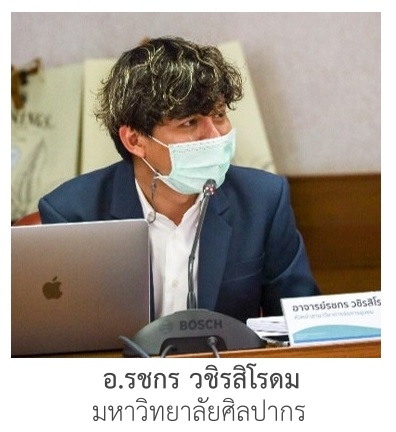
|
“ถือเป็นความร่วมมือของหน่วยงานวิชาการ เป็นบทบาทหน้าที่ในการทำงานที่ดี ส่วนงานต่างๆในพื้นที่ได้เข้ามาร่วมเรียนรู้ในการทำงานพัฒนาร่วมกัน โดยอาศัยชุดความรู้ ประสบการณ์จากชาวบ้าน และความรู้วิชาการจากหน่วยงาน ร่วมสร้างจิตสาธารณะต่อชุมชนให้เกิดความเข้มแข็งและยั่งยืน รวมถึงเป็นห้องเรียนให้นักศึกษา ถือเป็นการทำงานร่วมกับชุมชนที่เกิดประโยชน์อย่างแท้จริง” |
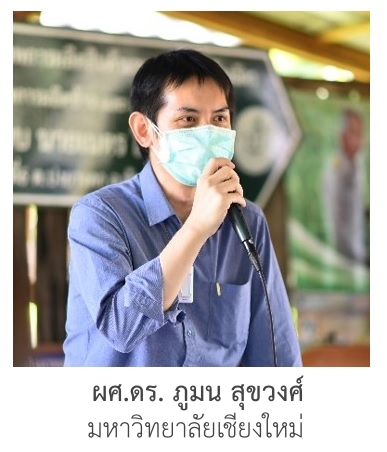
|
“โครงการ U-Volunteer ช่วยเติมเต็มความรู้ให้กับชุมชนถือเป็นเรื่องที่ดี เพราะการสร้างความรู้ และความเชื่อมั่นให้กับเกษตรกรเป็นการติดอาวุธให้เกิดการเรียนรู้ และการพัฒนาตนเองตลอดเวลา ในขณะที่มหาวิทยาลัยก็ได้มีส่วนในการหนุนเสริมข้อมูลเชิงวิชาการให้ต่อยอดเป็นความรู้ใหม่ในการพัฒนา” |
| “เรามีหน้าที่ในการให้ความรู้กับนักศึกษา ฝึกประสบการณ์ทั้งในห้องเรียนและนอกห้องเรียน การมีหน่วยงานมาสนับสนุนให้ได้มีโอกาสทำโครงการ เป็นการสร้างความรู้ให้กับนักศึกษาได้ ในขณะเดียวกันชุมชนก็ได้พัฒนาไปพร้อมๆกัน เพราะมีความรู้ควบคู่วิชาการที่โครงการเติมเต็ม” |
|
| “ถือเป็นความร่วมมือของหน่วยงานวิชาการ เป็นบทบาทหน้าที่ในการทำงานที่ดี ส่วนงานต่างๆในพื้นที่ได้เข้ามาร่วมเรียนรู้ในการทำงานพัฒนาร่วมกัน มหาลัยให้ความรู้วิชาการ ชาวบ้านให้ความรู้เชิงพื้นที่แต่มีเป้าหมายคือการอนุรักษ์วัวแดง” |
|


